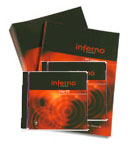 |
Inferno® is a compact operating system designed for building distributed and networked systems on a wide variety of devices and platforms. With many advanced and unique features, Inferno puts an unrivalled set of tools into your hands.
You can fetch it now as Free Software, on similar
terms to Linux or xBSD.
|
Cross-Platform Portability
Inferno can run as a user application on top of an existing operating system or as a stand alone operating system. Most of the popular operating systems and processor architectures are supported:
Host Operating Systems
- Windows NT/2000/XP
- Irix
- Linux
- MacOS X
- FreeBSD
- Solaris
- Plan 9
|
|
Supported Architectures
- ARM (ARM32, Thumb)
- Intel x86 (386 & higher)
- PowerPC
- SPARC
|
Inferno also runs as a plug-in under Internet Explorer version 4 and higher.
Each Inferno system presents an identical environment to the applications, irrespective of the underlying host OS or architecture, allowing the developer to work with a truly homogeneous environment across multiple different platforms.
Portable Applications
Inferno applications are written in Limbo®, a modern, safe, modular, concurrent programming language with C-like syntax. It is more powerful than C but considerably easier to understand and debug than C++ or Java. It is easy to express the concurrency in the physical world directly in Limbo's syntax.
Any Inferno application will run identically on all Inferno platforms.
Portable Code
Limbo code is compiled into architecture independent code for the Dis®
Virtual Machine, with a compact representation.
Dis can be interpreted directly (saving space), or compiled on the fly for a given target processor (saving time).
The choice can be made at run-time, per module.
The Dis architecture was carefully designed to make on-the-fly code generation straightforward.
Its instructions are easy to implement.
Transparent Resources
Inferno offers complete transparency of resources and data using a simple but powerful 'namespace' system. By representing resources as files and having one standard communication protocol — 9P (Styx®) — resources such as data stores, services and external devices can easily be shared between Inferno systems. A resource interface may be imported to the local system and used by the applications without them knowing, or needing to know, whether it is local or remote.
Security
High level security is an important part of the Inferno system. By using one standard protocol for all network communication, security can be focused on one point and provided at a system level. Inferno offers full support for authenticated, encrypted connections using a certificate based user identification scheme and variety of algorithms including:
- IDEA, 56 bit DES, 40, 128 and 256 bit RC4 encryption algorithms
- MD4, MD5 and SHA secure hash algorithms
A Complete Solution
Inferno is not only an operating system, it is also a complete development environment, providing all the tools necessary for creating, testing and debugging the applications that run within it.
- Acme IDE: includes editor, shell, advanced pattern matching tools & more
- Fast Compiler: with full syntax and compile time type checking
- Graphical Debugger: with full stack trace for currently executing threads
- Powerful Shell: with sophisticated scripting capabilities
- UNIX like commands: including bind, grep, gzip, mount, ps, tar, yacc...
| |
Features
|
Compact
Runs on devices with as little as 1MB of RAM
Complete Development Environment
Including Acme IDE, compilers, shell, UNIX like commands & graphical debugger
Limbo®
An advanced modular, safe, concurrent programming language with C like syntax.
Library Modules
Limbo modules for networking, graphics (including GUI toolkit), security and more...
Dis® Virtual Machine
Virtual machine providing target system independence and compact code.
JIT Compilation
Improves application performance by compiling object code on the fly (Just In Time).
Namespaces
Powerful resource representation using a single communication protocol, 9P. Import and export resources completely transparently.
Full Source Code
Full source code for the whole system and applications, subject to licence terms
And more...
Online manual pages
Full unicode support
Dynamic modules
Advanced GUI toolkit
Javascript 1.1 web browser
C cross compiler suite
Remote Debugging
Games, Demos & Utilities
|
|
